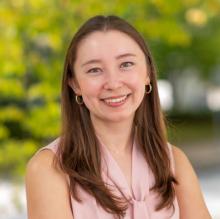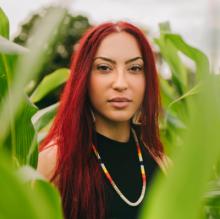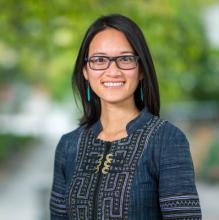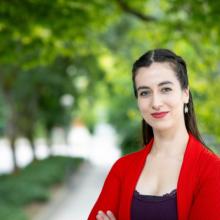For Amir Michalovich, literacy is more than reading and writing in language. It’s a process of design that includes production in a variety of modes and media, including digital media. That’s why for his research, the doctoral student and PSI scholar is conducting a participatory video study, where youth from refugee backgrounds explore real world issues of their choice through filmmaking, and learn to become literate in accessing, analyzing, evaluating, and producing digital media.
Using his own experience with filmmaking for learning, Amir is exploring the language, literacy and educational practices and challenges, as well as the intellectual and cultural resources of youth from refugee backgrounds in secondary schools in Greater Vancouver. The idea is to lead refugee-background youth to document and think about their lives using the kinds of media genres that they are familiar with (for example, vlogs), and develop a variety of communication and academic skills.
“I really believe filmmaking has this core potential to support the education of youth in general, but particularly refugee-background youth—to support them as producers of media, to help them project their concerns onto the screen. This could allow youth to bear difficult experiences and potentially transform them into learning opportunities.”
According to Amir, it is important to consider refugee-background youth separately in terms of having a different experience of migration. This particular population might have lived through wars, experienced separation from family members, and undergone difficult transitions. They might have had their schooling interrupted, and may come late to literacy.
“All of this adds up to the day-to-day challenges that newcomer youth experience in Canadian secondary schools: the need for language competency in English or French, the physical and emotional changes of adolescence and still negotiating ties to different cultures and places.”
The PSI scholar believes that in order to support youth from refugee backgrounds, we need to find ways to integrate them better into school learning, for example by bringing their out-of-school literacy practices into the classroom. He hopes this is the first step to incorporating digital media—like reaction videos, vlogs, video CVs, podcasts, digital stories, ASMR videos, etc.—not only in the language classroom but also across the curriculum.
“I want us to investigate how we can help youth from refugee backgrounds inquire about the issues they’re concerned about. I want them to be more engaged with different kinds of media so they can ultimately ask about the position they currently have in society, and try to think how they can change that, re-imagine themselves even, as members of a variety of professional communities.”
Research Description
As Canada is increasingly committed to refugee resettlement, there is a growing urgency to understand how refugee background youth can be better integrated into provincial education systems, considering their high rate of disappearance from Canadian schools. In BC alone, more than 10,000 refugees were resettled between 2015-2019, many in Greater Vancouver. These youth face grave educational challenges due to the forced nature of their migration and to varied difficult experiences. My qualitative multiple case study of 10 refugee background youth as diverse cases in two secondary schools in Greater Vancouver addresses this critical problem by situating youth as co-investigators of their own lives through participatory video, i.e., documentary video-making led by research participants, exploring real-world issues of their choice. The youth will also present their videos to stakeholders they identify as important. Interviews, classroom observations, artifacts, and recordings of video editing sessions will be analyzed to form a theoretical framework for informing education policy to promote integration.
The study answers the call in language and literacy education scholarship to examine migrant youth's literacy practices in multiple modes and languages, harnessing participatory video's emphasis on student-led inquiry and 21st-century forms of communication. It posits that engaging in participatory video production advances knowledge about how to foster refugee background youth's integration by facilitating their language and literacy practices, highlighting their needs, challenges, and intellectual and cultural resources, making those visible to the youth themselves and to various stakeholders, and opening possibilities for the youth to imagine themselves as members of different communities.
What does being a Public Scholar mean to you?
To me, being a Public Scholar means connecting my scholarly pursuits to the communities in which they are needed most and exemplifying the importance of academic knowledge and expertise, as well as the value of doctoral-level work, to communities and stakeholders outside of academia. Pursuing a fusion of empirically-based scholarship and community engagement that can also inspire policy changes encapsulates what Public Scholarship means to me.
In what ways do you think the PhD experience can be re-imagined with the Public Scholars Initiative?
There are many ways in which the PhD can be re-imagined with the Public Scholars Initiative. My doctoral study addresses this in two ways: (1) through participatory video's potential to reveal participants' wide range of literacy practices, that is, their communicative acts spanning multiple modes and languages shaped by their specific social and economic circumstances, the study will make visible, in multiple modes and languages, refugee background youth's language and literacy needs, challenges, and resources to themselves, to stakeholders (e.g., teachers, principals), and to policymakers (e.g., education ministry officials); (2) building on this form of participant-led inquiry that emphasizes the democratization of research and knowledge, I will develop the youth's work into a video-documentary chapter in my dissertation, which I will later disseminate to wider communities (e.g., through film festivals), in order to engage school communities and districts in Greater Vancouver and beyond with these youth's critical needs, challenges, and resources.
How do you envision connecting your PhD work with broader career possibilities?
For my future career goals, I plan to attain an expertise in the study of multimodality in education, particularly the ways in which multimodal meaning-making can facilitate immigrant and refugee background learners' engagement and integration in school learning, and also form an empirically-based theoretical framework for enacting change in education policy, that will nevertheless provide flexible routes for application in diverse contexts. By fusing my expertise in video and sound editing, producing, screenwriting and directing, with my expertise as a researcher using both qualitative and quantitative methods, I will utilize participatory video in my doctoral work to explore varied knowledge mobilization strategies to disseminate knowledge beyond academic journals and conferences. This experience will thus advance my understanding of the potential uses of digital media as part of research and policymaking, whether in the generation, analysis, representation and/or dissemination of data. Importantly, it will also provide me with insights into productive scholarly work in and out of academia: exploring public challenges, generating and disseminating knowledge across multiple platforms, and engaging with various communities and stakeholders from different domains of educational and scholarly work.
How does your research engage with the larger community and social partners?
Although the range of my work has also included engaging with varied communities in Greater Vancouver, such as MOSAIC in Burnaby and UBC Learning Exchange in Vancouver's Downtown Eastside, my doctoral work is mostly based on reciprocal partnerships with youth from refugee background in secondary schools. In line with my resolve to connect my scholarly pursuits to the communities in which they are most needed, I am continuously designing and facilitating complementary programs for English Language Learners in secondary schools which harness my expertise in video production to elevate curricular goals and to foster refugee background youth's visibility, agency, and learning. This engagement in educational practice in collaboration with teachers is invaluable in helping me pursue my mission of leading refugee background youth in becoming co-investigators of their own lives and in engaging school communities and districts in Greater Vancouver and beyond to help them address their own critical needs and challenges.
Why did you decide to pursue a graduate degree?
My decision to pursue a graduate degree is rooted both in my longtime interest in the study of youth multiliteracies, and in my future career goals. Pursuing a graduate degree, especially at UBC, will allow me to attain an expertise in the study of multimodality in education, particularly the ways in which multimodal meaning-making can facilitate immigrant and refugee background students' engagement and integration in school learning. Through my PhD studies I also intend to form an empirically-based theoretical framework for enacting change in educational policy, that will nevertheless provide flexible routes for application in diverse contexts. Consistently keeping in mind these complementary goals, I aspire to make use of my doctoral studies by paying forward the success of my own growth as a student, teacher and scholar.
Why did you choose to come to British Columbia and study at UBC?
Through my work as an independent filmmaker, research project manager, teacher, as well as mentor for community-based filmmaking groups, I became fascinated by the promise of inquiry-based learning, rooted in multimodal composition, for youth education. My motivation to study how this process works, its links to multimodal, synaesthetic meaning-making, its considerable potential for multilingual education, and the ways in which its endorsement might elevate the education of diverse learners, has led me to pursue doctoral studies in Literacy Education at UBC.
What is it specifically, that your program offers, that attracted you?
Aspiring to expand my studies of youth multiliteracies where they are needed most, I have taken a special interest in refugee background youth. In Canada, scholarly attention to the particular needs of this group is growing, especially in utilizing numerous communication modes and inquiry-based approaches to incorporate their cultural and linguistic diversity. What attracted me most to the program was the potential of contributing to such research endeavors as part of Professors Maureen Kendrick and Margaret Early's research project: "Language and literacy learning among youth refugees in Canadian secondary school classrooms."
Being a Public Scholar means connecting my scholarly pursuits to the communities in which they are needed most and exemplifying the importance of academic knowledge and expertise, as well as the value of doctoral-level work, to communities and stakeholders outside of academia.




